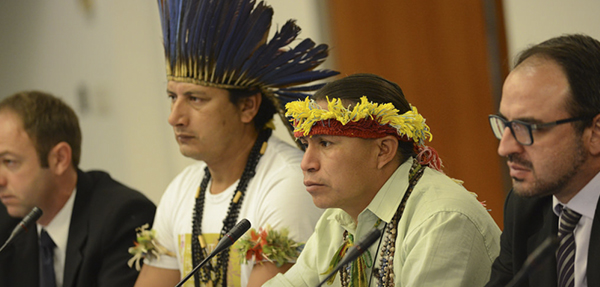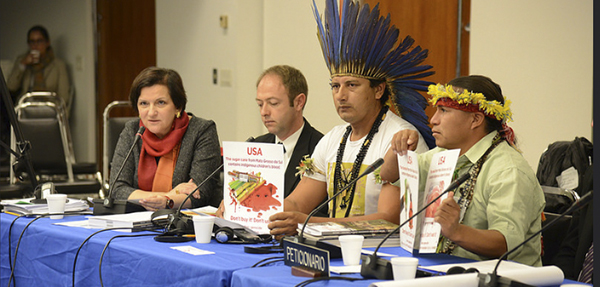The Association of the “Inhabitants of Pequia” (ACMP) is celebrating a historic event because their complaints have found an audience in the Inter-American Commission on Human Rights (CIDH – Washington, EUA, on 20th October 2015).
It is a very small community that has nevertheless suffered a lot from the grave and permanent violations of their rights that has finally gotten to see the legitimacy and the urgency of its vindications recognized.
This event has come to the limelight and has been widely published by the media both in the community and national levels as well as by the international press. No one can deny the urgency of resettlement of Piquia or deny the necessity of a major control of the emissions.
The Brazilian government recognized formally the CIDH report, which says “380 families in Piquia de Baixo still live with the effects of the contamination coming from the mineral exploration activities of the iron and steel industry” developed in this region. The government also confirmed its commitment to the solution of the problems faced by the communities and reiterated the importance of resettlement, reduction of the environmental degradation, taking care of the health of those affected and more importantly ensuring that the companies involved take responsibility.
The president of ACMP, Edward Dantas Cardeal met with José Luíz Machado de Costa, the Brazilian Ambassador in Washington at the American States Organization’s headquarters. In the said meeting he vividly described in detail the violations suffered by the families of Piquia de Baixo and their vindications. The Ambassador promised to dialogue immediately with the Brazilian Minister for Cities in order to speed up the inclusion of ACMP in the “Programa Minha Casa Minha Vida” (My House, My Life) outfit that would guarantee a significant state contribution towards the resettlement of the community.
Returning to Brazil, the President of the Association of the inhabitants of Pequia is already organizing a trip to Brasilia accompanied by his board of directors in order to impress upon the Minister for Cities with regard to the necessary processes required. “Our Association, through diverse agreements and negotiations with the companies, has been able to raise a significant amount of funds, with which we can begin the work. However, it is appropriate that the government complement the mentioned funds with the public funding that we have been negotiating since 17th December 2014, when the Caixa federal banking company approved the habitable urbanization project of resettlement” – narrates Cardeal.
Indeed, we are one step from what the Ambassador presented to the CIDH as “a model initiative of coordination among the public powers and private actors towards repairing and minimization of the harm caused to the whole community.
It is important that the government moves immediately from empty rhetoric to action.
More information about the audience
The audience took place on 20th October 2015 during the 156th period of sessions of the Inter-American Commission, the “Inhabitants of Pequia” (ACMP), Fédération international des droits de l’homme (International Federation of Human Rights), International Alliance of Inhabitants (a network of basic movements that fight for the right to a home), Global Justice (NGO for human rights with headquarters in Rio de Janeiro), “Justiça nos Trilhos” and VIVAT International (international NGO with consultative status to the UN).
Represented by the Community of Piquia de Baixo, the President of the ACMP Edward Dantas Cardeal and lawyers Danilo Chammas (JnT) and Raphaela Lopes (JG) intervened in the audience. Present also were Jimena Reyes (FIDH) and Jairo Godinho Guimarães, svd (VIVAT International). A part from the interventions, a synthesis of the Documentary “Desenhando un Sonho” (Drawing a Dream), of Julielli Soares and Mikaell Carvalho was presented. In the same audience, the topic of violence against the indigenous villages in Brazil was also discussed – a petition by the Council of Indigenous Missionary (CIMI) of the FIAN International and of the Global Justice.
During this period of sessions, the commission approved only 53 petitions of audience, strategically chosen from more than 500 petitions received.
The video with the integral recording of the audience can be watched in:
https://youtu.be/JqxkBmwLyB0
The official photos of the audience are available in:
https://www.flickr.com/photos/cidh/sets/72157659697935778
For more information about the documentary “Desenhando um Sonho”, contact Mikaell Carvalho: mikaell_carvalho@hotmail.com










